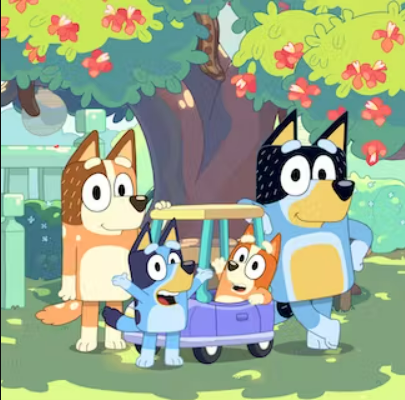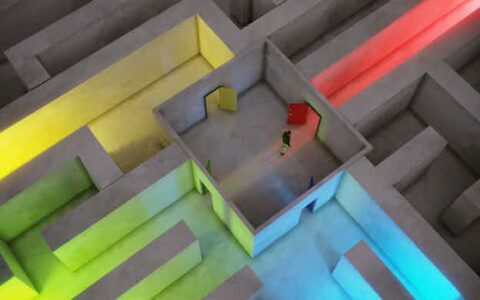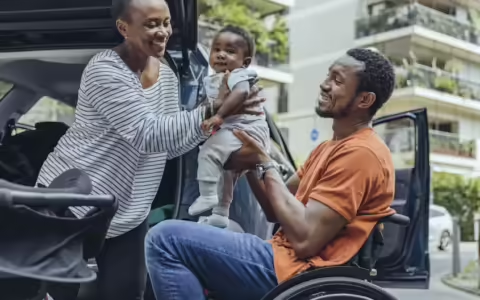Molly Scott, Research Scientist in Playful Learning, Temple University
Aria Gastón-Panthaki, Research Coordinator for Children’s Development, Harvard University
Douglas Piper, Ph.D. Student in Psychology, Georgetown University
Adults and kids love Bluey. This Australian animated show – hugely popular in the U.S. as well – focuses on a family of blue heeler dogs living in Brisbane. The seven-minute episodes feature 6-year-old Bluey; her 4-year-old sister, Bingo; her mom, Chilli; and her dad, Bandit. They depict the beauty of childhood and portray the realities of being a parent in our current age.
As developmental scientists who study children and how they interact with the world, we sort of adore Bluey too.
The show exemplifies what years of child psychology research have made clear: that children learn through play. Bluey illustrates a variety of age-appropriate caregiving practices that parents and caregivers can use in the everyday life of a child. Below we highlight five lessons depicted in select episodes and explain how certain scenes can provide inspiration for playful learning opportunities for all families.
1. Support children’s creativity
In the “Rain” episode, Chilli and Bluey get caught in a downpour. While Mom runs inside, Bluey is thrilled to be out in the rain and begins to build a dam against the water on a walkway. When her hands can’t contain the water, she tries a variety of household objects – blocks, an umbrella, a dollhouse – to do the job. Importantly, Bluey does not give up and continues to find creative solutions to reach her goal.
Researchers and leaders in a variety of industries point to creative innovation as a top skill that children will need to be successful in tackling the upcoming challenges of the 21st century.
Instead of stopping Bluey, Chilli recognizes how driven her daughter is to meet her goal, so she braves the rain and helps her to successfully build the dam. Chilli represents how caregivers can foster children’s creativity by asking open-ended questions and allowing children to explore various ways of solving a problem.
2. Use everyday materials for play
In “Flatpack,” after returning from the ready-to-assemble furniture store, Chilli and Bandit toss extra packaging from their new porch swing into the backyard. Bluey and Bingo use these items to construct a fantasy world. The girls let their imaginations take them on a journey from swimming like fish in a foam pond to hopping like frogs on a cardboard island.
Play experts use the term “loose parts” for items without a defined play purpose that can be used in many ways and encourage children’s creativity. This episode shows Bluey and Bingo engaged in free play with such objects and portrays how deeply children can play even if they don’t have conventional toys or guidance from a caregiver.
3. Help kids process emotions through play
Play is a natural way that children emotionally process a variety of difficult experiences. Childhood experts emphasize that pretend play gives children the freedom to work through their fears and feelings.
In “Copycat,” Bluey and Bandit find an injured parakeet on a morning walk and take it to the vet. We then see Bluey engaged in a play scene in which she casts Bingo in the role of the parakeet and reenacts the morning. When Chilli, playing the vet, tells Bluey that Bingo is all better, Bluey protests: “No, you have to pretend it’s bad news, that the [parakeet] is dead.” Chilli seems wary to proceed but, importantly, follows her daughter’s lead in the play.
Similarly, in the episode “Early Baby,” Bluey’s friend Indy uses play to work through a difficult life experience: having a younger sibling in a neonatal intensive care unit. In their classroom, Indy and her friends play “early baby” where they have to wash their hands before holding the baby doll and keep her in “a fish tank with holes in it” – an incubator.
4. Promote multigenerational relationships
These episodes explore the relationship between the girls and their grandparents. In “Grannies,” Bluey and Bingo are dressed up as grannies in search of a can of beans. After raiding the cabinets, Bluey scolds a dancing Bingo because “grannies can’t floss!” The girls argue and settle the debate by video chatting with Nana, learning she indeed cannot do the popular dance. When Bingo gets upset, Bluey helps Nana learn to floss by guiding her through the dance moves over video chat.
In “Phones,” the girls teach Grandad about growing up in a digital world by creating fake smartphones with cardboard and crayons. They show Grandad how to navigate various apps to order food. Armed with his own crayon and a stuffed crocodile, Grandad sneaks the croc into Bingo’s basket and creates a “Croc Catcher” app for the girls to call for his assistance.
Research shows that strong relationships between grandparents and children benefit both generations. Grandparents teach children about their family’s history while children bring grandparents up to speed with the modern world. A recent study of grandparents found that video chat enables this bonding between generations, and the “Phones” episode shows this when Nana learns how to fit herself in the video chat frame and do a new dance. While Grandad is initially baffled by using apps for everything, the girls help him navigate this modern convenience through play.
5. Foster self-regulation
The episode “Wagon Ride” shows a common parenting scenario. Bandit encounters a friend in public and begins chatting with the friend, moving his attention away from Bluey. Bluey cannot wait any longer and interrupts her dad. Soon after, Bandit works with his daughter to establish a way she can control her impulse to interrupt him while also feeling acknowledged by her father: Whenever Bluey wants to get her dad’s attention, she can place her hand on his arm, and he’ll place his hand over hers to acknowledge that he knows she’s waiting.
Helping a child develop self-regulation skills like the ability to wait patiently is important, as such skills predict many positive lifelong outcomes. Higher levels of self-regulation ability are often tied to better mental health and academic performance. Bandit exemplifies how caregivers can help build their child’s self-regulation ability by trying to make it fun.


















